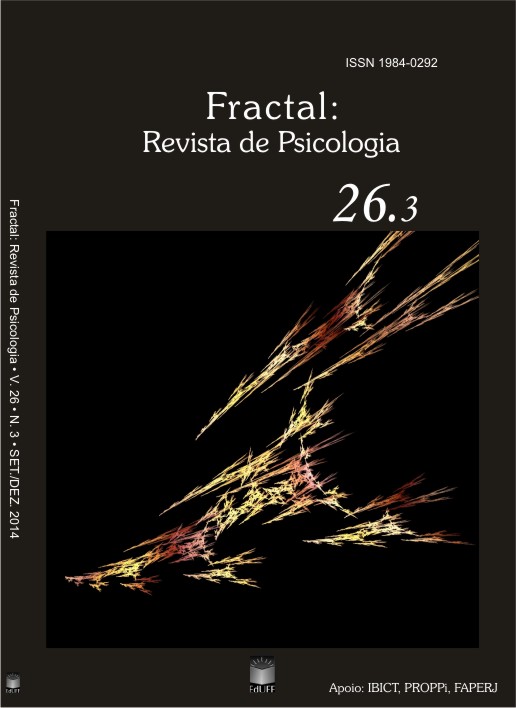The power of cyborg in the assembling of modes of post-identities subjectivation: partial connections among art, psychology and gender
Keywords:
post-identity, cyborg subjectivity, aesthetics subjectivityAbstract
In line with a psychology more attached to the “becoming [devenir]” rather than to the essence, the goal of this paper is to ground the importance of understanding subjectivity as a process, mainly when regarding our current discussions about identity and gender. After that, we do some linkage between art and psychology. For us, art is understood as a powerfulmanner to encourage modes of subjectivation that have difference as an inherited relation. Lastly, we draw our attention upon some fragments of the contemporaneous artist, Mathew Barney’s work-of-art (specially, “Cremaster”), to see how it runs through the binaries of gender boundaries and launches post-identity lines of subjectivation.Downloads
References
BAREMBLITT, G. Compêndio de análise institucional e outras correntes. Rio de Janeiro: Record. 1998.
BARROS, M. Livro sobre nada. Rio de Janeiro: Record, 1997.
BLANCHOT, M. A conversa infinita. São Paulo: Escuta, 2001.
BOURRIAUD, N. Estética relacional. São Paulo: Martins Fontes, 2009.
BUTLER, J. Bodies that matter: on the discursive limits of “sex”. New York: Routledge, 1993.
BUTLER, J. Défaire le genre. Paris: Amsterdam, 2006.
COSTA, C. L. O leito de procusto: gênero, linguagem e as teorias feministas. Cardernos Pagu, n. 2, p. 141-174, dez. 1994.
CREMASTER (The Cremaster Cycle). Direção: Matthew Barney. 1994-2002.
DELEUZE, G. Lógica do sentido. São Paulo: Perspectiva, 1974.
DELEUZE, G. Foucault. São Paulo: Brasiliense, 1998.
DELEUZE, G. Conversações. São Paulo: Ed. 34, 2006.
DELEUZE, G.; GUATTARI, F. O que é a filosofia?. Rio de Janeiro: Ed. 34, 1992.
DELEUZE, G.; GUATTARI, F. Mil platôs: capitalismo e esquizofrenia. São Paulo: Editora 34. 1996. v. 1.
DELEUZE, G.; GUATTARI, F. Mil Platôs: capitalismo e esquizofrenia. São Paulo: Editora 34. 1999. v. 3.
DELEUZE, G.; GUATTARI, F. Mil platôs: capitalismo e esquizofrenia. São Paulo: Editora 34. 2002. v. 4.
FOUCAULT, M. História da sexualidade: o cuidado de si. Rio de Janeiro: Graal, 1985. v. 3.
FOUCAULT, M. Dits et écrits 1954-1988. Paris: Gallimard, 1994.
FOUCAULT, M. História da sexualidade: o uso dos prazeres. Rio de Janeiro: Graal, 1998. v. 2.
GIL, J. Escrito sobre arte e artistas. Lisboa: Relógio D’Água, 2005.
GUATARI, F. As três ecologias. São Paulo: Papirus, 1990.
GUATTARI, F. Da produção de subjetividade. In: PARENTE, A. Imagem Máquina. São Paulo: Editora 34. 1993. p. 177-191)
GUATTARI, F. Caosmose: um novo paradigma estético. São Paulo: Editora 34. 2000.
GUATTARI, F.; ROLNIK, S. Cartografias do desejo. Petrópolis, RJ: Vozes. 1999.
HALL, S. Identidades culturais na pós-modernidade. Rio de Janeiro: DP&A, 1997.
HARAWAY, D. Um manifesto para os cyborgs: ciência, tecnologia e feminismo socialista na década de 80. In: HOLLANDA, H. H. O. B. (Org.). Tendências e impasses: o feminismo como crítica da cultura. Rio de Janeiro: Rocco, 1994. p. 243-288.
LAURETTIS, T. A tecnologia do gênero. In: HOLLANDA, H. H. O. B. (Org.). Tendências e impasses: o feminismo como crítica da cultura. Rio de Janeiro: Rocco, 1994. p. 206-242.
PENEDO, S. L. El Laberinto queer: la identidad en tiempos de neoliberalismo. Barcelona: Egales, 2008.
LOURAU, R. Análise institucional. Petrópolis, RJ: Vozes, 1995.
PRECIADO, B. Testo Yonki. Madrid: Espasa Calpe, 2008.
ROLNIK, S. Cartografia sentimental: transformações contemporâneas do desejo. São Paulo: Estação Liberdade, 1989.
ROLNIK, S. Psicologia: subjetividade, ética e cultura. In: SILVA, A. do E. et al. (Org.). SaúdeLoucura: subjetividade. 2. ed. São Paulo: Hucitec. 1997. v. 6, p. 13-21.
ROLNIK, S. Subjetividade em obra: Lygia Clark, artista contemporânea. In: BARTUCCI, G. (Org.). Psicanálise, Arte e Estéticas de subjetivação. Rio de Janeiro: Imago, 2002. p. 365-381.
SIBILIA, P. O homem pós-orgânico: corpo, subjetividade e tecnologias digitais. Rio de Janeiro: Relume-Dumará, 2002.
TEIXEIRA-FILHO, F. S. Subjetividade estética: o gesto da sensação. 1993. Dissertação (Mestrado)–Pontifícia Universidade Católica de São Paulo, São Paulo, 1993.
Downloads
Published
How to Cite
Issue
Section
License
Authors publishing in this journal agree to the following terms:
- Authors retain copyright and grant the journal the right of first publication, with the work simultaneously licensed under the Creative Commons Attribution License allowing sharing of the work with acknowledgement of authorship of the work and initial publication in this journal.
- Authors are permitted to enter into additional contracts separately for non-exclusive distribution of the version of the work published in this journal (e.g., publishing in an institutional repository or as a book chapter), with acknowledgment of authorship and initial publication in this journal.

This work is licensed under a Creative Commons Attribution 4.0 International License.
To the extent possible under the law, Fractal: Journal of Psychology has waived all copyright and related rights to the Reference Lists in research articles. This work is published in: Brazil.
To the extent possible under law,Fractal: Journal of Psychology has waived all copyright and related or neighboring rights to Reference lists in research articles. This work is published from: Brazil.







